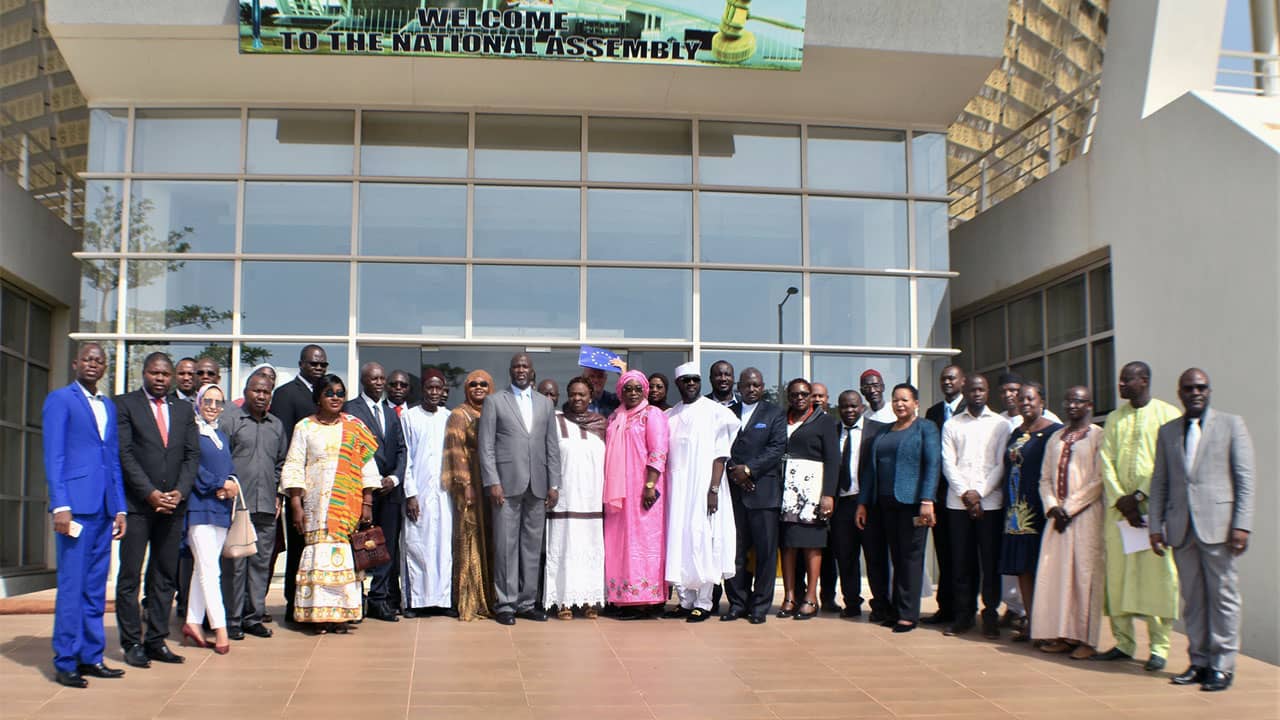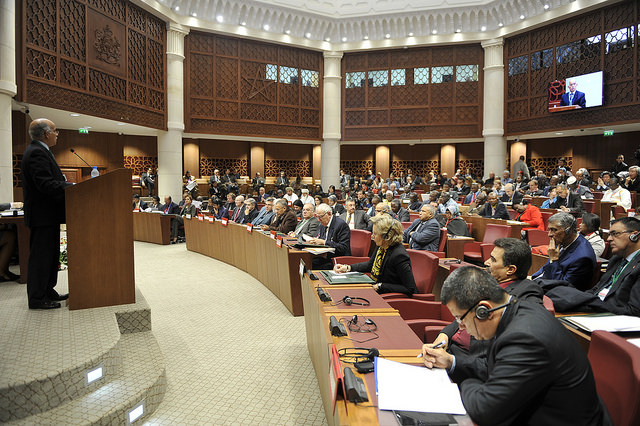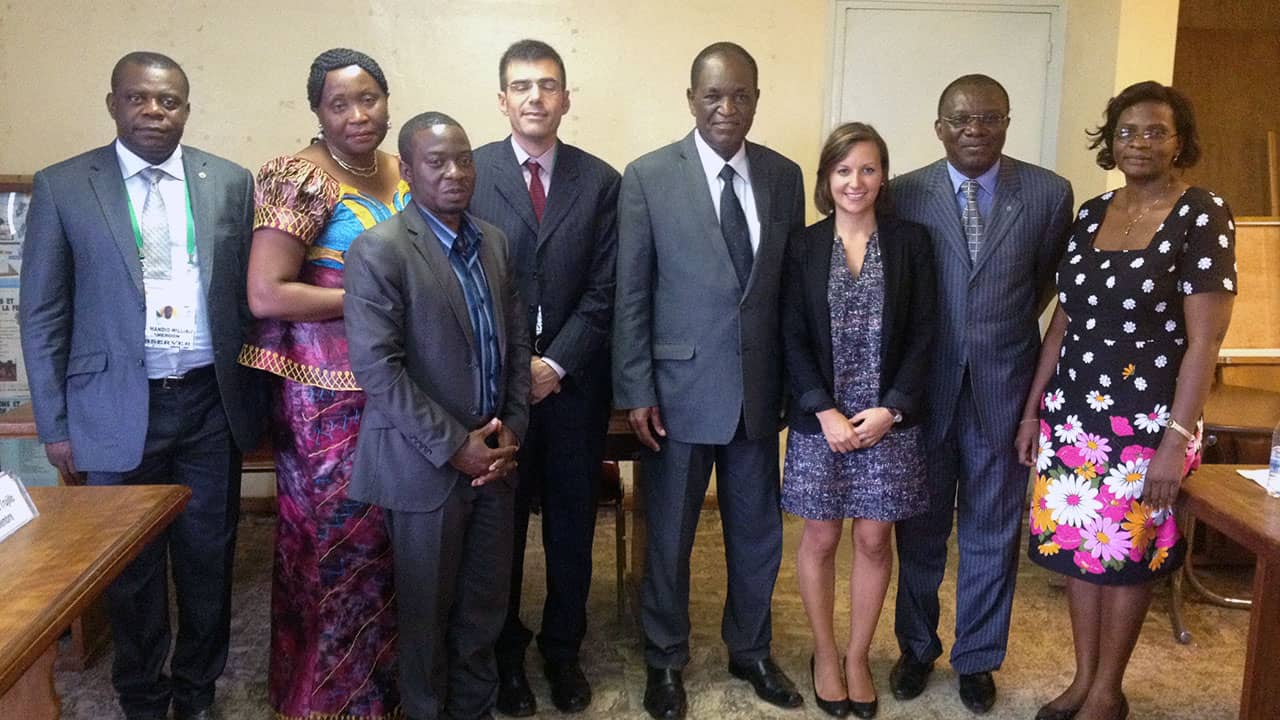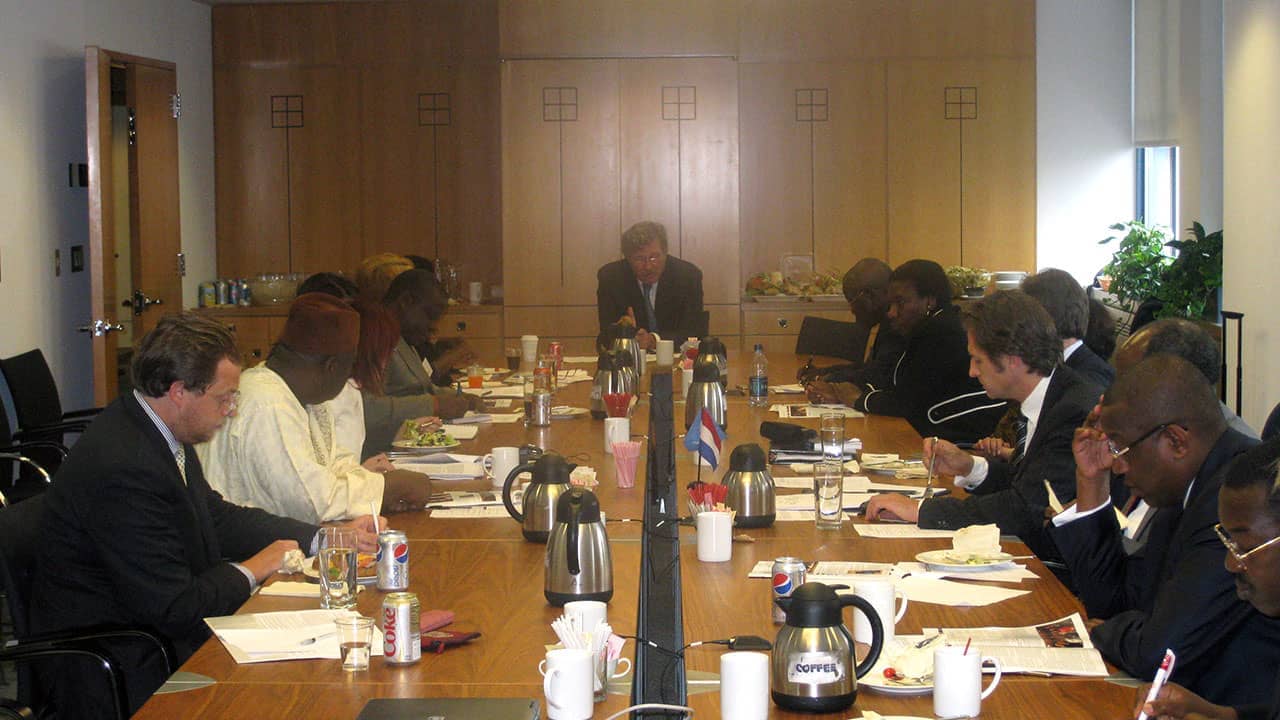Nigeria signed the Rome Statute on 1 June 2000 and deposited its instrument of ratification of the Rome Statute on 27 September 2001.
Since 2002, PGA has been working with Nigerian MPs to promote the adoption of implementing legislation incorporating the crimes contained in the Rome Statute and ensuring mechanisms of cooperation with the ICC.
PGA launched its work in Nigeria starting with their participation at the 24th Annual Parliamentary Forum of PGA entitled "An informal Parliamentary Assembly for the International Criminal Court and the Promotion of the Rule of Law" that took place in Ottawa, Canada.
On 17 October 2003, PGA Member Senator Sanusi Daggash presented a Resolution ordering the Foreign Relations Commission of Nigeria’s Senate to investigate the nature of the agreements between Nigeria and the United States or any other country on ICC operations or competency. The resolution was presented after the attempts by Senator Daggash to obtain the public divulgation of the Bilateral executive Agreements of Non Surrender signed with the United States.
PGA Members from Nigeria have actively participated in PGA’s Consultative Assemblies of Parliamentarians for the ICC and the Rule of Law (CAP ICC) since its session in 2003.
Upon request of then PGA Member Ms. Martha Bodunrin ( former MP House of Representatives) at the ICC Assembly of States Parties in December 2011, PGA provided technical assistance to its members in drafting a comprehensive bill to implement the Rome Statute Crimes into Nigeria’s national legal system based on the Revised Commonwealth Model Law. This Bill had been presented by then PGA Member and MP Ms. Martha Bodunrin to the Speaker of Parliament, the Majority Speaker, and the Chairpersons of relevant Committees. The government then drafted a government bill to implement the Rome Statute, namely the “Crimes against Humanity, Genocide and Related Offences Bill 2012”. The efforts of PGA members led to the bill having passed the first reading in Senate. This Bill was further in the Second Reading in Senate (but had not passed the House yet) in May 2013 as “A Bill for an Act to Provide for the Enforcement and Punishment of Crimes Against Humanity, War Crimes, Genocide and Related Offences and to Give Effect to Certain Provisions of the Rome Statute of the International Criminal Court in Nigeria, 2013” (SB 183). The Bill has not moved further since then.
On June 12, 2014, PGA Members sent an Open Letter to the President of Nigeria that called on Ending Impunity for Boko Haram through the ICC. No reply was received.
PGA is in constant communications with its leading Member in the fight against impunity in Nigeria, but has not been able to understand until today what is blocking the draft Bill to implement the Rome Statute from moving to the third reading in Senate.
Kampala Amendments of 2010
-
Nigeria attended the Review Conference and joined the consensus to adopt the two Kampala Amendments.
-
Nigeria has not yet ratified the Amendments to the Rome Statute adopted by the 2010 Review Conference (Kampala Amendments) on the crime of aggression and on the use of certain weapons in armed conflict not of an international character.
Involvement of Nigerian MPs in PGA-ICC Related Actions
- November 05, 2013 - PGA facilitated a meeting between ICC President Judge Song and the Deputy Speaker of the National Assembly and the Chairs of relevant Committees to discuss ICC’s role in the global fight against impunity and the status of the Nigerian draft legislation on implementing the Rome Statute at national level.
- Nov. 2013: PGA’s most active Member in Nigeria promoting the implementation of the Rome Statute of the ICC, Hon. Ali Ahmad, Chairman of the Justice Committee, actively participated in the Twelfth Session of the Assembly of States Parties for the ICC in 2013, as part of Nigeria’s official delegation.
- March 4, 2009: ICC Pre-Trial Chamber Arrest Warrant President SUDAN
- 2-5 Dec. 2010: Participation of PGA Members in their official delegations attending the 20th session of the Africa-Caribbean-Pacific – European Union Joint Parliamentary Assembly (ACP-EU JAP), Parliament of the DRC
- May 27-28: VI Consultative Assembly of Parliamentarians for the ICC & the Rule of Law Kampala, Uganda - Photo Gallery
- June 18-19: Strategy Meeting on the politics of international justice: impact and effectiveness of the ICC - Towards the Review Conference of the Rome Statute Parliament of the Netherlands, The Hague
- 10 - June 2009: PGA Roundtable Briefing on the Crime of Aggression, UN, New York" "June 10 PGA Side-Meeting to the Inter-seasonal meeting on the Crime of Aggression at the ICC Assembly of States Parties, Permanent Mission of The Netherlands to the United Nations / PGA Roundtable Briefing on the Crime of Aggression Permanent Mission of the Netherlands to the United Nations. - Photo Gallery
- 30 - 31 October 2008: V Consultative assembly, Santo Domingo, Dominican Republic "30th Annual Forum Strengthening Democratic Institutions, Accountability and the Rule of Law and V Consultative Assembly of Parliamentarians for the International Criminal Court Santo Domingo, Dominican Republic" - Photo Gallery
- 6 - 7 June 2008: Regional Parliamentary Meeting, Paramaribo "Regional Parliamentary Meeting on Ratification of the Rome Statute Paramaribo, Suriname / Paramaribo Parliamentary Seminar on International Justice and Security: The Role of the ICC
- 17 - 20 March 2008: Participation in 15th ACP-EU JAP, Ljubljana Slovenia Participation of PGA Delegation to 15th Africa-Caribbean-Pacific-European Union Joint Parliamentary Assembly (ACP-EU JAP), Ljubljana, Slovenia
- 10 - 11 January 2008: "ICC Implementing Legislation in West Africa: Roundtable Discussion Freetown, Sierra Leone"
- 10 - 11 January 2008: Implementing Legislation Ghana, Liberia, Nigeria and Sierra Leone Discussions in Freetown, Sierra Leone
- November 2007: Round-Table Discussion on the Fight against Impunity and the Access of Victims to Justice (ACP-EU JAP), Kigali, Rwanda
- 6 - 7 December 2004: 26th Annual Forum: 3rd Session of the Consultative Assembly of Parliamentarians for the ICC and the Rule of Law, Wellington, New Zealand "PGA's 26th Annual Forum: Third Session of the Consultative Assembly of Parliamentarians for the International Criminal Court and the Rule of Law Wellington, New Zealand"
- September 2003: Consultative Assembly of Parliamentarians for the ICC and the Rule of Law” – II session (United Nations Headquarters, New York, USA)
- 17 October 2003: Resolution presented by Senator Sanusi Daggash ordering the Foreign Relations Commission of Nigeria’s Senate to investigate the nature of the agreements between Nigeria and the United States or any other country on ICC operations or competency. The resolution was presented after the attempts by the Senator Daggash to obtain the public divulgation of the Bilateral Agreements of Non Surrendering both from the Foreign Relations minister and from the president.
- January 2003: Briefing on the Implementing Legislation to Incorporate the Rome Statute into Nigerian Law (Abuja, Nigeria)
- November 2002: 24th Annual Parliamentary Forum of PGA entitled "An informal Parliamentary Assembly for the International Criminal Court and the Promotion of the Rule of Law" (Ottawa, Canada); PGA 24th Annual Forum: First Parliamentary Assembly for the ICC (Ottawa, Canada)
Agreement on Privileges and Immunities of the Court (APIC)
Nigeria has yet to accede to the APIC.
Additional Agreements
-
As a member of the African, Caribbean and Pacific community (ACP), and as signatory of the revised Cotonou Agreement of the ACP with the European Union, Nigeria has recognized the importance of the ICC as a mechanism for peace and international justice, and has committed to promote the ratification and implementation of the Rome Statute, to seek to take steps towards the ratification and the implementation of the Rome Some Statute, and to fight against international crime giving due regard to the Rome Statute. For more information on the work of PGA within the ACP-EU mechanism see, click here.
-
Human Rights Council Universal Periodic Review: Nigeria was reviewed during the 17th session of the UPR in October 2013. No recommendations regarding ICC were made.













